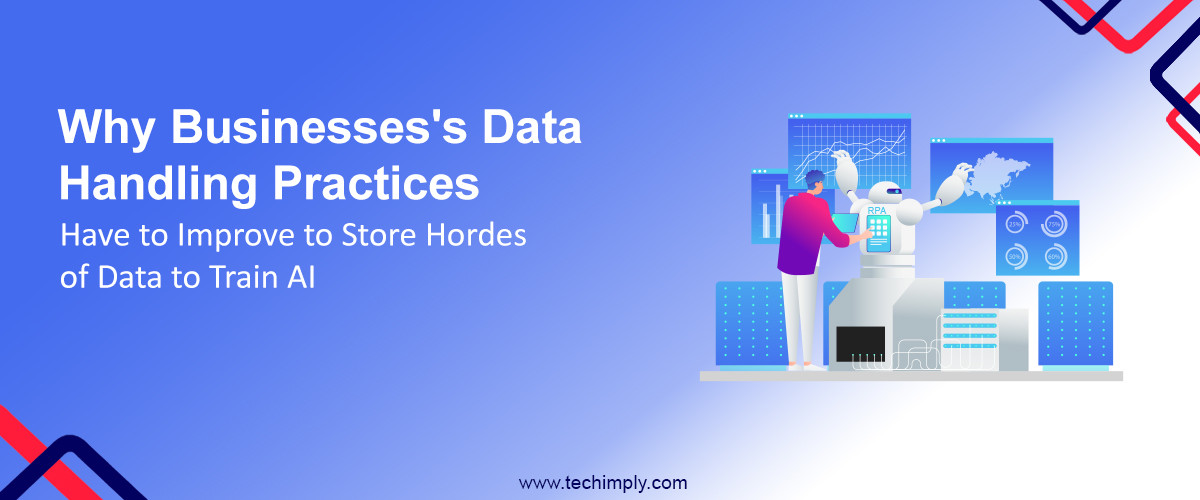A lot of conversation in the business world right now is angled toward AI. For many business owners – small and large business owners alike – AI could prove to be the key to cut costs, boost efficiency, and quickly build profit across the board.
Not a lot of business owners, however, are discussing how this can be done. Artificial intelligence isn’t a magical box with a big, green switch. Nor is it an automated human who will know what you want as soon as you ask it something – we’re not quite there yet!
AI is technology that needs to be taught and trained. Like any software, the correct code needs to be inputted to make it tick, and for AI, that code is known as data. Specifically, company and user data that can be processed by AI to train it efficiently.
That all sounds pretty simple, but the problem is that business data collection, as a practice, is not quite up to scratch yet. It’s true that around 65% of businesses collect personal data – with a further 50% collecting non-personal data – but how much of that data is going to be efficient in training an AI model? Similarly, can we say that this data is being handled properly to ensure data quality?
These are the questions that must be asked before AI is efficiently integrated into the business world. But before that, let’s look into what exactly the end goal is.
How Can AI Be Used By Businesses?
While AI has become a hot topic in the last couple of years, it has been around for a while now, and it is even being used by businesses. The most common type of AI at the moment is process automation of both physical and digital tasks. These include transferring data from various systems of record, reconciling failures across multi-cloud networks, and ‘reading’ documents for analysis using natural language processing.
Chatbots, recommendation systems, and personalised ad targeting are also made possible by AI technology, with 16% of companies using machine learning to implement AI more fully into their business model. It is this type of AI – known as cognitive engagement and insight – that we are going to be focusing on. With machine learning, business owners have the chance to:
-
Optimise internal operations
-
Enhance features and performances of products or services
-
Make better, more educated decisions
-
Free workers from mundane, time-consuming tasks
-
Optimise external processes, including digital marketing
-
Capture useful data which may otherwise have been missed
-
Reduce headcount through complete automation of specific business processes
To achieve all of this, however, artificial intelligence – specifically, the ML model – must be trained with the appropriate data. And this creates a bit of a problem.
What’s the Problem With Current Data Handling?
It’s no secret in the business world that data collection and handling has been an Achilles heel. Even the most successful companies have tripped up over the last decade, either through unethical data harnessing or inefficient data handling that has led to catastrophic breaches. Even after GDPR and CCPA rules and regulations, data collection is still a sore subject, and this is especially true among consumers.
The reason data removal companies like Incogni have grown in popularity over the past few years is due to the increased awareness of how consumer data is being harvested. Whether it’s through data brokers or the over-abundance of personal information on Google, consumers are not happy about handing over their private data without active consent.
Infamous data breaches have also not helped. Although large portions of consumer data may be going to businesses, there’s no way for the consumer to know that it is safe. Without appropriate cybersecurity measures and handling techniques, businesses can easily make personal data more vulnerable than it needs to be, leaving it subject to hackers who will use it for anything from identity theft to scamming bait.
How Can Data Handling Be Improved?
That’s not to say it cannot be improved, however. While some businesses may think that data privacy regulations are getting in the way – ‘data is profit’, after all – they are not only making consumers safer but increasing the chances of strong, focused data collection that can be stored for efficient AI training. To start off, businesses need to get organised.
-
Focused Data Collection
According to a mind-blowing report released in late 2022, as much as 90% of the data collected and stored by businesses is useless. Not only this, it actively gets in the way of useful data. This could prove very damaging when it comes to training AI.
Put simply, if the data being fed to AI is bad, then machine learning tools are going to be useless. It must be remembered that the quality demands on this type of AI are steep, and are specific for every organisation. If a company is utilising AI to analyse user data, for instance, then it will never get definitive, concise insight if the data being harnessed is poor.
-
Organised and Defined Data Management Policies
The proof is not just in data collection, either. To train AI and ensure it can boost company productivity, a business must provide hordes of useful data, so there must be clear, efficient storing processes to ensure it remains safe and usable. There must be guidelines that are followed not just for compliance, but for productivity and coherency.
Data access policies should be defined, as well as data retention and data security policies. Potential issues must also be addressed, with management policies that can be enforced as and when data-related issues arise. These must also be reviewed and updated on a regular basis, minimising data-related risks.
-
Hiring a Cybersecurity Team
On data management and procedures – as well as AI and ML training – effective training must also be provided to employees. There’s a reason why phishing is the most common practice utilised by hackers in 2024. A lot of the risks involved in data handling – including the external cybersecurity risks – come down to human error. If employees are trained to spot potential cybersecurity threats and have an intense understanding of how they hold and transfer data, then data protection will be greatly increased, as well as improved compliance and business-customer relations.
Speaking of cybersecurity, a team must also be brought in to ensure multi-cloud systems are secure. Going into 2024, cybersecurity teams are not just company ‘add-ons’ that are there to keep things running, they are crucial cogs in the company that can be the difference between success and failure. To handle such a vast amount of data, and be able to use it to train AI, cybersecurity teams and tools must be integrated to keep it organised, functional, and secure.
A New Outlook on Data
Through safe, focused, and ethical collection, and then organised, well-managed, and working data handling procedures, businesses can finally begin to talk about the real potential of AI. Without that, however, AI is never going to reach the heights that so many businesses hope it will. Not only that, but the same businesses will be putting themselves on a slippery slope toward data inadequacy. If data is going to continue to play a key role for businesses – and even bigger when AI is more fully integrated – it needs to be collected, managed, and handled effectively to avoid this. In 2024 and beyond, that is simply a must.






